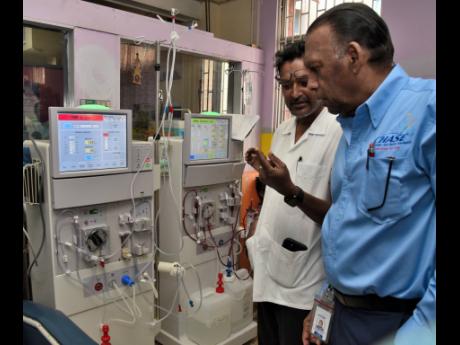Northeast yearns for renal unit to ease burden on kidney patients
Donald Thompson has been travelling from his home in Prospect Land Settlement, Port Antonio, twice weekly for the last seven years to access dialysis treatment at the Kingston Public Hospital (KPH).
It is a long and exhausting journey from Portland, the 58-year-old told The Gleaner, especially as he had to be driving himself for the last few years.
“It’s tiring, and there are times when you get off the machine and your blood pressure is low and that type of thing … . Right now, I’m going through a situation where I have to be using a walker,” he said.
And while he lauds the nursing staff at KPH as among the best he has seen, the businessman, who owns a spice manufacturing and distribution company, said he would feel more comfortable if this service was offered at the Port Antonio Hospital in his home parish.
Currently, no hospital under North East Regional Health Authority’s (NERHA) banner, which covers St Mary, Portland and St Ann, has a renal unit.
“It is a needed entity, and I believe that every parish in Jamaica should have something like what KPH has so that it could ease the burden of those who lose a lot of what they have worked for because of the cost of dialysis,” he said.
To this end, Thompson created the Port Antonio Renal Unit Committee four years ago. The 36-member committee consists of a number of kidney failure patients from the parish, whose mandate is to advocate for a haemodialysis machine at their local hospital.
He said their short-term projects include fundraising measures to assist other patients with travelling expenses.
But NERHA Chairman Laura Heron told The Gleaner that the Port Antonio hospital, a designated Type C facility, would not offer that level of care.
“The health facilities right across the island have been neglected for a very extended period and it’s only now that some of them are being upgraded and getting these additional ward spaces for these types of units,” she said.
Heron shared that the St Ann’s Bay Hospital in the NERHA is at the “midpoint” in getting a nephrology unit that will offer dialysis treatment. Heron said she expects the unit to be completed by the next financial year.
On Friday, the Kingston Public Hospital (KPH) was equipped with 10 replacement haemodialysis machines. The machines were donated by the Culture, Health, Arts, Sports and Education (CHASE) Fund at a cost of $30 million. This brings to 17 the number of machines at the facility.
Two new ambulances, valued at $33 million, were also donated by the agency, bringing to 18 the number of ambulances in the South East Regional Health Authority’s fleet, with two assigned to the KPH.
KPH is one of five public hospitals that have renal-care units. The others are the University Hospital of the West Indies in St Andrew, the Spanish Town Hospital in St Catherine, the Cornwall Regional Hospital in St James, and the Mandeville Regional Hospitals in Manchester.
Senior Medical Officer at KPH, Natalie Whiley told the Gleaner that the hospital offers two shifts daily, with a third shift for emergency cases. She said currently, more than 400 patients are on the waiting list.
And while acknowledging that the replacement of the machines is a “big advantage”, Health Minister Dr Christopher Tufton admitted that it is not enough.
“We live in a society where lifestyle often forces us to be under-resourced and less than adequate capacity because of the disproportionately high numbers of persons who use these kinds of facilities,” he said during a tour of the KPH’s renal unit on Thursday.
According to the minister, some 40,000 Jamaicans are at fourth-stage renal failure, meaning that the disease has progressed to the stage where a kidney transplant or dialysis is needed.
“The public health system does not have the capacity to support 40,000 [people], twice a week,” he said.
Tufton argued that the public health system will never be able, in the short term, to address this type of demand, and noted that the average dialysis session in the private system costs up to $15,000 per session.
The minister insists that a healthy lifestyle is the best way to combat these chronic illnesses.
“The solution doesn’t lie in more dialysis machines. As much as we need to add capacity, the solution lies in trying to reduce the demand, which means helping Jamaicans to do what is necessary to minimise particularly as it relates to premature mortality risks,” he said.
He said that the Government will be launching a national intervention programme that includes screening, which will allow citizens to take preventive methods.
He also announced that his ministry is also working on an organ transplant programme, which will create an organ donor registry and legislation to support transplants.

